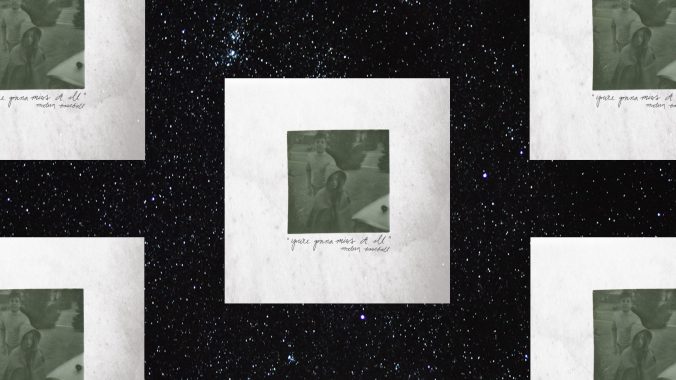I Hate Worrying About the Future: You’re Gonna Miss It All at 10
10 years ago today, Modern Baseball released their second album and changed the course of fourth-wave emo forever.

When people talk about Modern Baseball now, it’s usually in a “you had to be there” kind of way. But “there” could mean any number of tangible or intangible places, ranging from the side of early-2010s Tumblr where live recordings of “Constant Headache” and Man Overboard’s “Defend Pop Punk” logo dominated dashboards, to the Philly house that the members of Modern Baseball lived in during the band’s early years—where you could see them play a basement show for just $3 or a picture of Michael Jordan.
Philadelphia remains a hotbed for DIY music and the communities built around it—thanks to artists like Greg Mendez, They Are Gutting A Body Of Water and musician/producer Heather Jones (of Ther and Sadurn). But now that streaming and social media have decentralized the act of creating and sharing music, there’s less emphasis on fitting in with a specific sonic tradition tied to a particular locality. It’s not like Modern Baseball and the host of other then-up-and-coming Philly-based bands that they played shows with have a ton in common besides being guitar groups who were in the same place at the same time—utilizing Bandcamp as a jumping-off point for getting their music out there.
Speaking of Bandcamp, Modern Baseball’s rise to popularity and their sustained fanbase doesn’t look all that different from fellow Philly artists like Alex G or Japanese Breakfast (or Little Big League before them), despite these acts sounding almost nothing alike. In some ways, Modern Baseball’s Philly connection felt more prominent than that of their indie rock loyalist counterparts—mostly due to their place-based lyricism, the city of Philadelphia being such a prominent backdrop to their public narrative, and the early cosigns they got from scene predecessors like The Wonder Years—who’d made the city such a major part of their band’s identity on songs like “Came Out Swinging” and “Logan Circle.” Today, discussions of regionality simultaneously feel obsolete and prescient, especially in emo, with individual bands adamantly repping their hometowns. Meanwhile on social media, fans are quick to slap the “Midwest Emo” genre tag onto any band with tappy guitars and shouty vocals, regardless of whether they’re from Philly or SoCal or Florida.
It’s hard to speak about a now-defunct band that was so central to a particular scene without slipping into starry-eyed mythologizing, especially a group that was A) as influential to the following decade of pop-punk and emo as Modern Baseball were and B) disbanded unceremoniously after just a few highly potent years together. Furthermore, it can be hard to speak on the lasting impact of a record like You’re Gonna Miss It All without feeling like you’re falling into the nostalgia pit with the masses, wishfully theorizing based on nothing at all about an alleged Modern Baseball reunion and coming off like one of those doomsday cults that predicts an impending apocalypse every six months.
Look, I understand the impulse to continue to mourn a beloved band and the simpler times that they’ve come to represent. I myself have spent many an evening watching grainy concert footage of Sports-era Modern Baseball shows and enviously listening to my friends who were lucky enough to see them live talk about how unforgettable it was. Maybe it’s just too easy to don rose-tinted glasses when looking back on a band who put out three good-to-great records in a row and dipped before the quality of their work ever had the chance to do the same.
I’ve been thinking a lot about the purposes that this kind of music serves—music made by and for young people (I realize that this is a vast and relative generalization)—and the way our love for the music that connected with us when we were young evolves with us as we mature beyond its target demo. I connected most with You’re Gonna Miss It All—and Modern Baseball’s discography in general—when I was in college, around the same age the band members were when they released their first two albums. It’s because of both of these interacting factors that You’re Gonna Miss It All feels like such a college album, to a cringingly earnest degree.
When I talk about my college-aged self now, I find myself falling into the pattern of treating her like an old friend I’ve quietly grown apart from—my wistfulness bearing the implicit understanding that, though we had some fun times together, it’s probably for the best that we don’t really hang out anymore. I’ll be the first to admit that the years in which I listened to You’re Gonna Miss It All most frequently were the ones where I was at my most academically intelligent but emotionally stupid, my booksmarts at diametric odds with my impulse control, my communication skills and my ability to read a room. I was also, like most people in their late teens and early 20s, profoundly insecure and judgmental, holding both myself and the people around me to impossible standards.
Listening to Modern Baseball’s catalog now, that’s how the narrative personas of both Bren Lukens and Jake Ewald come across a lot of the time. This is in no way an insult to either of their characters, or an attempt to psychoanalyze two people who I’ve never met. It’s not really a comment on them as people at all, but on their ability to tell stories about people whose good intentions often surpass the maturity and clarity required to follow through with them. Most of the fuck-ups chronicled in Modern Baseball songs are not the result of malice, but miscommunication.
-

-

-

-

-

-

-

-

-

-

-

-

-

-

-

-

-

-

-

-

-

-

-

-

-

-

-

-

-

-

-

-

-

-

-

-

-

-

-

-








































